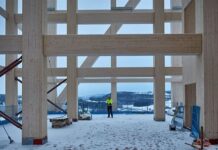It is well to be noted that warmer winter weather goes on to mean European construction contractors happen to be experiencing less business disruption as the climate goes on to warm, Maurice van Sante, who happens to be an ING senior economist, said in the report that was titled Construction companies see efficiency gains due to milder winters.
Giving out the data compiled by ING Research, NASA as well as Our World in Data, van Sante went on to note that the temperature anomalies within Northern Hemisphere went on to reach greater heights almost two degrees Celsius higher, on average than what they were in 1985.
They wanted to see if the rising temperatures had already gone on to have a measurable impact on the European construction companies’ yearly production cycles, remarked van Sante, thereby noting that two indicators happened to be used in measurement:
- The share in terms of companies that go on to mention their production levels happened to be limited during winter season stretching from January and February and summer from July and August periods because of the weather conditions.
- The variation when it comes to actual construction volumes within these periods
What this research went ahead and found out was over 30% reduction of EU contractors over the last three decades, who said that their activities were restricted due to bad weather from January to February.
Apparently, in 1991, nearly 50% of EU contractors went on to say that their activities got restricted due to bad weather and that this share went on to dip gradually to less than 20% throughout these winter months in 2024.
Hence, there is indeed a clear decline when it comes to the winter weather challenges within construction sector, that could as well be attributed to the rising temperatures.
Van Sante said the sharpest dip in winter complaints happened to come from Belgium, Germany, and the Netherlands.
It is well to be noted that in Germany in the 1990s, over 55% of the contractors went ahead and complained about the winter weather. This has now decreased to less than 40% across the past ten years.”
Van Sante remarked that the EU construction sector has clearly gone on to become more productive throughout the past decades, across the months of January and February.
The fact is that between the periods of 1995 and 1999, average construction volumes were 22% below the yearly average. This has gone on to dip to 13% between 2019 and 2023.
Much fewer weather disturbances throughout the winter months go on to make construction 9% more productive all across these two months, which happens to be an annual gain of 1.5%.
There are some who like it hot? Sweltering summers happen to be a non-issue for European construction.
While gains within the productivity in winter can very well be seen as positive, the rising global temperatures throughout the year the year are not.
Yet, van Sante opines, a reciprocal loss of productivity within the summers, right from heat or extreme weather, is simply not going to take place in a measurable way.
But he did note that the record highs during the summertime happen to be increasing the frequency when it comes to cancelled work days.
Where building companies have gone on to cite much fewer complaints in terms of disturbing winter weather, the opposite happens to be quite true during the summer period, which is between July and August), said van Sante, thereby adding that the change happens to be less profound.
As per Van Sante, in 1991, 2% of the EU contractors went ahead and complained about summer weather conditions, compared to 4.6% who went ahead and cited weather as an issue in 2023.
Although it is still quite marginal, more contractors happen to be experiencing weather-related challenges in the summer, said van Sante. It is well to be noted that the average production dip was much smaller in July and August. The effect when it comes to climate change is kind of still barely noticeable there.
Temperature does not happen to be everything since the contractors are much better prepared in terms of winter conditions.
An anomaly within the report showed that the northern countries of Europe have somewhat consistently lodged fewer complaints pertaining to winter weather as compared to their southern counterparts.
The fact is that contractors across Finland and Sweden have, as a matter of fact, always had fewer issues pertaining to weather conditions as compared to Germany, Belgium, as well as the Netherlands, explained van Sante.
He remarked that the ING team went on to find three possible reasons for this discrepancy:
- Building companies that are active in cold areas of Europe happen to invest in special winter equipment so that the construction can go ahead since their winters happen to be colder and also last longer. For example, their transport vehicles happen to have winter tyres or even spikes.
- More production activities take place indoors- prefab so as to cope with longer periods of darkness as well as cold weather.
- In terms of project planning, they already happen to take into account that certain building activities, like excavation works, happen to be not feasible during the winter months. They plan them during the summer, which makes disturbances caused by frozen ground less common.
The fact is that in the continent’s hottest regions, the same kind of weather resilience as compared to northern countries in the winter happens to be observed in the summer.
Extreme heat can go on to make working outside impossible, remarked van Sante. Yet, there are Spanish contractors who do not complain as much pertaining to hot weather during the summer months of July as well as August. Just like the Swedish as well as Finnish contractors, during winter, they go ahead and also adjust their building plans to the summer heat, thereby making them less susceptible when it comes to productivity losses.
Summer construction productivity loss is not only about heat
But it is not only about sweltering temperatures that go on to disrupt summer activity.
As a matter of fact, van Sante went ahead and suggested that record heat happened to have a marginal effect on recent years’ losses in terms of productivity in the industry.
A changing climate also goes on to influence river water levels, he explained. Low water levels in the summer pose a risk pertaining to supply chain disruption since many heavy building materials, like sand and gravel, happen to be often transported by barges, which at times cannot be loaded to full capacity, and even the routes are also simply cancelled.
Such kind of low water levels are presumably what is indeed causing the marginal increase when it comes to summer disruptions, van Sante concluded.
Growing temps offsetting the labor issues
The change in the weather, has gone on to be an aid to what has been a historically smaller labor pool.
More than 14 million people happen to work in the EU construction industry, which itself means that a 1.5% productivity growth results in over 200,000 fewer workers that are needed, said van Sante. Sans that kind of productivity increase, structural labor shortages in the construction sector would have been much bigger than they happen to be today.
Symptoms happen to be the silver lining, not positive harbingers
Although it may seem like a warming planet has gone on to create an ideal environment for construction activities within some sections of the Northern Hemisphere, van Sante has gone ahead and cautioned that these changes are diamonds in what has gone on to become an increasingly rough environment.
The fact is that it needs to be absolutely clear that climate change isn’t a positive thing, as van Sante remarked.

































